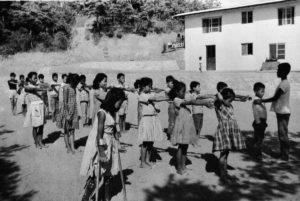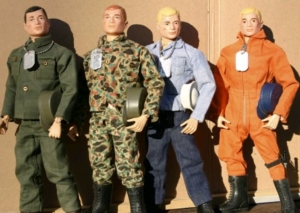
By Debbie Gregory.
The international adoption of Korean children began in 1953. Comprised mostly of mixed race children, some 200,000 Korean children were surrendered to orphanages, with more than 50% of those adoptees being sent to the United States. Most of the mixed race children were born to Korean women and American or UN soldiers.
Now the non-profit 325 Kamra is on a mission to build a DNA database to help South Korean adoptees find their birth parents, including U.S. military veterans, by offering free DNA kits to all veterans and their descendants.
Many of these children were the product of a thriving sex industry both during the 1950-53 Korean War and after it ended while fulfilling peace-keeping duties.
The mixed-race children were shunned by society and denied Korean citizenship, which could only be passed on by the fathers.
Sarah Savidakis, the president of 325 Kamra, tested her DNA through a commercial genealogy service and identified a first cousin, once removed. The relative helped her identify and connect with a half-brother and half-sister. She learned that her father — who was of Scottish and Irish descent — had passed away in 2014.
Savidakis and the other mixed-race co-founders of 325 Kamra seek to collect DNA, medical histories and genealogical information from potential birth families; to provide kits to adoptees; and to help them reunite.
DNA testing kits are free to all Korean adoptees and every military veteran who served on the divided peninsula or their descendants.
Kits have been donated by Thomas Park Clement, a mixed-race adoptee and founder and president of medical device company Mectra Labs. Clement has pledged to provide $1 million worth of DNA kits to the Korean adoptee community. As part of his efforts, he has provided kits to Korean adoptees in the United States as well as to U.S. veterans of the Korean War.
The popularity of over-the-counter DNA testing kits sold by by Ancestry.com and 23andMe have been instrumental in the success of the program.
Veterans who wish to receive a DNA kit may contact 325Kamra via their website at www.325kamra.org or email the following information to [email protected]:
Name and mailing address (no PO boxes)
Name of servicemember
Branch of service of servicemember
Dates servicemember was in Korea
Rank of servicemember
Unit servicemember was attached to in Korea
Photo of servicemember in uniform if possible
If the servicemember is unavailable to test, siblings and children may test on their behalf
Military Connection salutes and proudly serves veterans and service members in the Army, Navy, Air Force, Marines, Coast Guard, Guard and Reserve, and their families.

By Debbie Gregory.
Army veteran Stanley Weston, the man who conceived the “GI Joe” doll died on May 1st at the age of 84.
The toy hit stores around the same time that American troops began flowing into Vietnam, and it became a bestseller.
Weston did his homework for his concept toy, voraciously reading about and consuming all the information he could on warfare and the military. He also purchased everything he could on each branch of the military.
He then presented his “outfitted action figure” idea to fellow Korean War veteran Donald Levine at a Rhode Island toy company that later became Hasbro. Levine is credited with creating and naming “GI Joe” and getting it to market. “GI Joe” did not have a sworn enemy or mission.
Unfortunately, Weston never reaped financial rewards from his creation. He had agreed to sell his concept, “outfitted action figures” to the toy company for $100,000. He then watched as his concept grew into a $100 million dollar success story. Weston would have been better off taking a royalty on each toy.
Hasbro became a leading toy manufacturer mostly due to the popularity of their top sellers, GI Joe and Monopoly.
Stanley Weston was born in New York City on April 1, 1933. He attended New York University. He then joined the Army at the end of the Korean War.
Weston returned to New York, married, and completed his master’s degree at New York University. He then joined the emerging licensing and merchandising industry. Weston represented iconic pop culture figures like Twiggy and Soupy Sales. He formed his own company called Leisure Concepts and also represented “Charlie’s Angels” along with its star, Farrah Fawcett. He also represented the World Wrestling Federation, Nintendo and the Major League Baseball Players Association. His products represented the likeness of every baseball player in both the National and American leagues.
Many years later, Stanley Weston filed a lawsuit against Hasbro. He claimed that he and the toy company had signed an agreement that the rights to “GI Joe” would revert to Weston and his heirs in 2020, but there was no copy of this agreement. Last year, the lawsuit was settled by Weston’s daughter, Cindy.
Weston is survived by his brother, his daughter Cindy, sons Steve and Brad, and five grandchildren.
Decades later, millions of children are still playing with “GI Joe.”
© 2006-2020 Military Connection, Owned by BL, LLC. All rights reserved